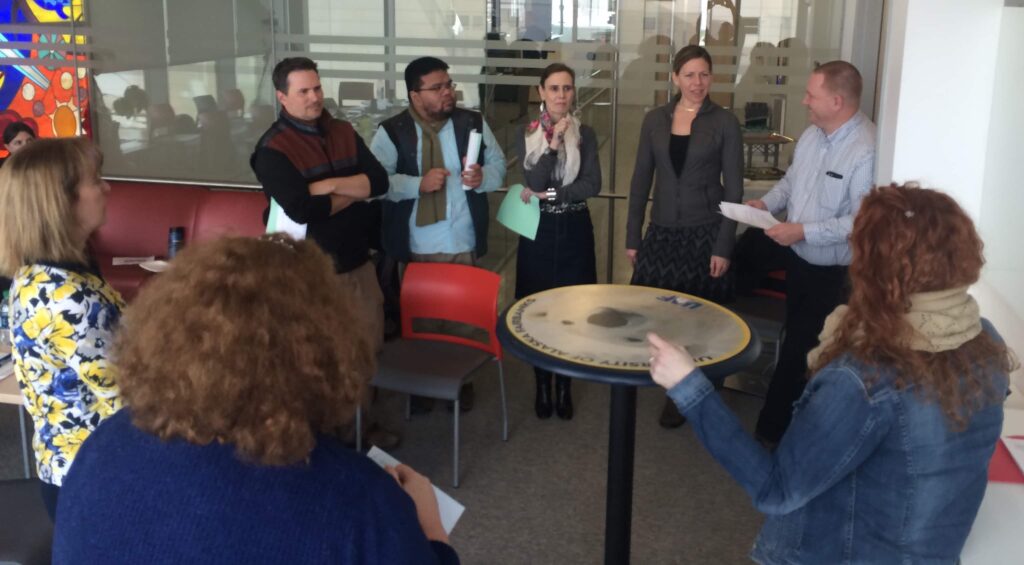Immersive Roleplay
An activity where students apply background knowledge of subjects and personas to act out the roles of professionals or historical figures.
What is It?
In immersive roleplay, players, or students, take on the role of a studied figure and apply what knowledge they have to meet the goals of the person of whom they are playing the part. As in the real situation, different players in an immersive roleplay scenario will be aware of different motivations and purposes that will influence their actions. Often, players will have contrary, or at least orthogonal goals they are pursuing which are different than other participants in the scenario.
Because immersive roleplay is modeled after actual experiences that either were significant in historical terms, or which students will likely face, varied outcomes, even failure or participants to meet their objectives are part of the learning experience. One practitioner of immersive historical re-enactments, Mark Carnes, noted that these sorts of activities taught most of hist students not only how to deal with failure, but also how to reach real growth through it.
Immersive roleplay provides an excellent opportunity for students to either be introduced or apply background information in a setting where knowledge of historical facts and political motivations can aid those in pursuit of their goals. Immersive roleplay provides direct experiential learning and empathy for different perspectives. In education settings, the experience of immersive roleplay is usually followed by discussion amongst the participants, out of their roles. This process can reinforce the learning experience and help players understand the events they just took part in in a more relaxed way. This kind of role play can also be used to assess a player’s knowledge and ability to perform in certain situations.

How-to Instructions and DIY
Here is a list of Links to “How To” Instructions:
- Go to Settings in your Zoom account to review the range of options for interactivity,participant management, and moderation.
- Instructions for using the Slack messaging and group discussion application for asynchronous communication. Slack runs on all platforms and devices.
Considerations for the Online Class
- Role Play activities for the online asynchronous class are different from face to face or teleconference classes. Students have time to consider their responses. You may wish to alter the discourse to encourage thoughtfully considered contributions to the discussion.
- Discourse can happen using built in discussion areas of many learning management systems, including Canvas.
- Be sure to include “out of role” discussions and have students share what they learned, their feelings about the acting of other students, and special insights that they developed as a result of the roleplay. Your students will be very eager to reflect on their shared experience.
In Practice
- Peter Westley, pwestley@alaska.edu, uses immersive roleplay in FISH 110 to provide students some appreciation for the intricacies of fisheries management and the complex relationship of commercial, sports fishing, subsistence and management stakeholders.
- Susan Todd, sktodd@alaska.edu, makes immersive roleplay a central part of several of her NRM 101 activities including having students re-enact the Paris Climate Change Negotiations.
- Heather Dahl, hdahl2@alaska.edu, has her Counseling students practice interview techniques with volunteer clients before their internships.
Watch: Immersive Simulations in Counselor Education
Further Resources
- Teaching tip: Roleplay
- The Reacting Consortium. (2016). Reacting to the Past. Retrieved from https://reacting.barnard.edu
- CTL: Quality Matters Resources
Research Foundations
Carnes, M. C. (2014). Minds on fire: How role-immersion games transform college. Cambridge: Harvard University Press.
Galea, C. (2001). Experiential simulations: Using web-enhanced role-plays to teach applied business management. Information Technology and Management, 2(4), 473-489.
McLaughlan, R., & Kirkpatrick, D. (2004). Online roleplay: Design for active learning. European Journal of Engineering Education, 29(4), 477-490.
Yu, M., & Kang, K. ja. (2017). Effectiveness of a role-play simulation program involving the sbar technique: A quasi-experimental study. Nurse Education Today, 53(April), 41—47.
